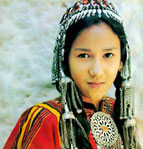
The Turkic peoples are a group of peoples residing in northern, central and western Eurasia who speak languages belonging to the Turkic language family. These peoples share, to varying degrees, certain cultural traits and historical backgrounds.
The term Turkic thus represents a broad, ethnolinguistic group of people and includes existing cultures such as the Kazakhs, Kyrgyz and Turkish people, as well as historical societies such as the Seljuq and Timurid. Although usually referring to the citizens of Turkey, the word Turks may also be used loosely to refer to all Turkic peoples. The adjective Turkish, on the other hand, usually specifically refers to the Turkish language, the citizens of Turkey.’, ‘The term Turkic as a common reference to various Turkic-speaking people began its spread after the appearance of the Turkic Kaganate in the sixth century, and did not gain a universal acceptance among some Turkic peoples until influenced by European nationalistic concepts of the nineteenth century.
Prior to that, various Turkic-speaking people were known under different general ethnic names. The etymology of the base word Turk has a few competing generic explanations.
The family of Turkic languages is a subdivision of the Altaic language group and is one of the most geographically widespread in the world, being spoken in a vast region ranging from Europe to Siberia.
